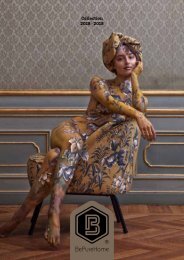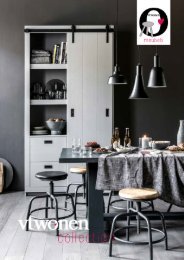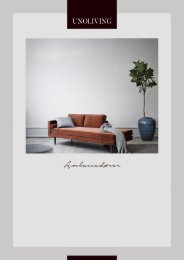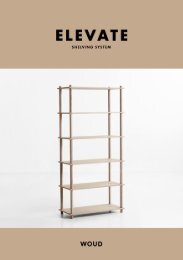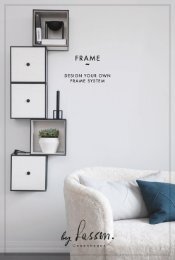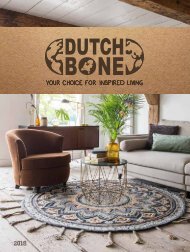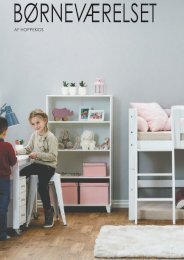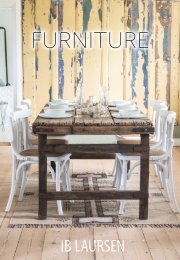ICONS
Sika-Design har revitaliseret ikoniske møbler fra nogle af Europas mest dygtigste og største arkitekter og designere. I den eksklusive kollektion, finder du bl.a. designs fra Arne Jacobsen, Nanna og Jørgen Ditzel, Viggo Boesen og Franco Albibi.
Sika-Design har revitaliseret ikoniske møbler fra nogle af Europas mest dygtigste og største arkitekter og designere. I den eksklusive kollektion, finder du bl.a. designs fra Arne Jacobsen, Nanna og Jørgen Ditzel, Viggo Boesen og Franco Albibi.
Create successful ePaper yourself
Turn your PDF publications into a flip-book with our unique Google optimized e-Paper software.
NANNA & JØRGEN DITZEL ARNE JACOBSEN FRANCO ALBINI VIGGO BOESEN R. WENGLER
SIKA-DESIGN<br />
A PROUD TRADITION OF CRAFTMANSHIP<br />
Our passion for and understanding of rattan dates<br />
back decades. We have been around long enough<br />
to call ourselves Scandinavia’s oldest producer of<br />
rattan and wicker furniture.<br />
The story of our company begins in 1942, when<br />
Ankjær Andreasen produced the first batch of baskets,<br />
lamps, flower tables and other smaller interior<br />
items made of rush and willow. In the 1950´s,<br />
Ankjær expanded his production to include a furniture<br />
series made from rattan, and the company<br />
Sika-Design was firmly established.<br />
The rattan was imported from the Far East, and<br />
Ankjær traveled there to purchase the rattan for<br />
his wicker makers in Denmark. During a trip in<br />
1972, he was so impressed by the skilled wicker<br />
weavers that he decided to establish a wicker furniture<br />
factory in Malaysia. Since then, the Far East<br />
has been essential to our furniture production. Today,<br />
we manufacture our furniture in our own factory<br />
in Indonesia. Ankjær‘s son, Knud Andreasen,<br />
took over the company in 1983, however Ankjær<br />
continued his daily “inspections” until his death in<br />
1997. On my 10th birthday, my father allowed me<br />
to attend a fair where Sika-Design was exhibiting a<br />
series of rattan furniture.<br />
On that day, I knew I wanted to be a part of his<br />
company, and my passion for rattan furniture began.<br />
Since 1996, my father and I have worked side<br />
by side bringing Sika-Design into the new century<br />
with great design, while never letting go of our<br />
strong heritage of great craftsmanship.<br />
Products from Sika Design are developed and marketed<br />
in accordance with our management system<br />
for environmental and social responsibility ISO<br />
14001/2004 and SA8000/2008. Certified by Bureau<br />
Veritas Certification.<br />
<strong>ICONS</strong><br />
With our <strong>ICONS</strong> Collection we revitalize iconic<br />
pieces of furniture from some of Europe’s most<br />
skilled and important architects and designers.<br />
Arne Jacobsen, Nanna and Jørgen Ditzel, Viggo<br />
Boesen and Franco Albini were all pioneers of their<br />
time – they broke new ground when they made experimental<br />
shapes with the sturdy materials of rattan<br />
and wicker and created sculptural and timeless<br />
icons. With great respect and admiration for the<br />
original designs and in close collaboration with the<br />
descendants of these renowned furniture makers,<br />
we are pleased and proud to be able to bring these<br />
icons back.<br />
LOUISE ANDREASEN<br />
3rd generation,<br />
Sika-Design<br />
2
3
OUR DESIGNERS<br />
ARNE JACOBSEN<br />
(1902-1971)<br />
Arne Jacobsen, architect and designer. Educated<br />
at the Royal Danish Academy of fine Arts, School<br />
of Architecture in Copenhagen. His designs are<br />
famouse worldwide and his first design ever was<br />
a rattan chair.<br />
NANNA & JØRGEN DITZEL<br />
(1923-2005) (1921-1961)<br />
Nanna Ditzel graduated in Furniture design from<br />
The Royal Danish academy of Fine Arts in 1946.<br />
She quickly established her own design studio together<br />
with her husband Jørgen Ditzel. Among<br />
her designs are textiles for Kvadrat and silverware<br />
for Georg Jensen.<br />
4
FRANCO ALBINI<br />
(1905-1977)<br />
Franco Albini was an Italian Neo-Rationalist<br />
architect and designer. In 1929 he began his<br />
professional career working for Gio Ponti.<br />
VIGGO BOESEN<br />
(1907-1985)<br />
Viggo Boesen embarked on rattan furniture<br />
design combining modernist style with<br />
the hard wear qualities of the rattan material.<br />
Viggo Boesen´s FOX chair won a Danish design<br />
competition in 1936.<br />
R. WENGLER<br />
Royal Danish wicker maker to<br />
the Crown Estbl. 1854<br />
R. Wengler was a pioneer in rattan production.<br />
What he did to the craftsmanship and the way he<br />
challenged the material, lays the groundwork for<br />
the way we know rattan furniture today.<br />
5
HANDMADE WITH<br />
PASSION<br />
6
RATTAN -<br />
A NATURAL AND SUSTAINABLE MATERIAL<br />
Rattan is a climbing plant that grows as a vine in<br />
the rainforest. The vines have been known to grow<br />
up to hundreds of metres long. Rattan grows naturally<br />
without disturbing the existing structure and<br />
balance in the rainforest while at the same time<br />
cleaning the air by transforming CO2 into clean<br />
air.<br />
As rattan grows by climbing the trees in the rainforest,<br />
it is important to preserve the trees in order<br />
to preserve the rattan production. This means that<br />
rattan indirectly helps to preserve the rainforest in<br />
Indonesia. It is the fastest growing tropical wood<br />
and it regenerates in 5-7 years.<br />
RATTAN IS IMPOSSIBLE TO WEAR OUT<br />
Rattan can handle both high and low temperatures<br />
as well as humidity and fluctuations in temperature.<br />
Rattan does not need any special attention.<br />
For daily cleaning it can be wiped with a cloth or<br />
brush.<br />
There is a common misconception that rattan furniture<br />
is made of bamboo, however there is big difference<br />
between rattan and bamboo although they<br />
look similar on the surface. Rattan stems are solid<br />
whereas bamboo stems are hollow. This means<br />
that if the material is bent into shape, it is rattan.<br />
Rattan furniture is extremely hardwearing and can<br />
last for generations.<br />
7
OTTOMAN<br />
BY FRANCO ALBINI<br />
Designed in 1951 Material: Manau & Tohiti rattan<br />
Item no: FA-55 - FA-65<br />
8
FRANCO ALBINI<br />
ARCHITECT AND DESIGNER<br />
Franco Albini (1905-1977) was an Italian Neo-Rationalist<br />
architect and designer, renowned for<br />
merging modern minimalistic furniture design<br />
with traditional Italian craftmanship. In his creations<br />
he used raw, inexpensive materials.<br />
He had great success in the 1950’s where he created<br />
a range of distinguished furniture designs, including<br />
the famous and fashionable rattan chairs<br />
Margherita and Gala, both features as part of the<br />
permanent exhibition Museum of Modern Art<br />
( MOMA) in New York.<br />
Franco Albini obtained three Compasso d’Oro<br />
awards, the most prestigious Italian design prize.<br />
In 1951, Franco Albini designed Ottoman and<br />
the Belladonna sofa made made of rattan, which<br />
has since been chased by connoisseurs all over<br />
the world. We are proud to have the productions<br />
rights to this wonderful piece of design as part of<br />
our <strong>ICONS</strong> collection.<br />
9
BELLADONNA<br />
BY FRANCO ALBINI<br />
Designed in 1951<br />
Item no: FA-95<br />
Material: Manau & Tohiti rattan<br />
10
11
CHILL<br />
BY NANNA DITZEL<br />
Designed in 1961 Material: Gold sega core weave<br />
Item no: ND-20<br />
NANNA DITZEL<br />
MOTION AND BEAUTY<br />
The “Hanging Egg Chair” is a critically acclaimed<br />
design that has enjoyed praise worldwide ever<br />
since the distinctive sculptural shape was created<br />
by Nanna & Jørgen Ditzel in 1959. The design<br />
of the “Hanging Egg Chair” has long since been<br />
dubbed timeless, whereas rattan had its golden<br />
age in the 1960’s when skilled wicker weavers and<br />
architects crafted beautifully sculptured furniture<br />
out of the challenging material.<br />
The Danish designers Nanna and Jørgen Ditzel<br />
exhibited their first furniture designs in Copenhagen,<br />
when they were still students at the Industrial<br />
Arts and Crafts College, Copenhagen.<br />
Ditzel’s experimental approach to materials resulted<br />
in the 3-legged rattan chair, which is designed<br />
on the basis of the body. It is one of the first chairs<br />
based on the idea of integrating a shell on a frame<br />
as one piece.<br />
After Jørgen Ditzel’s death in 1961, Nanna continued<br />
to design, and in 1968 she moved to London<br />
where she established the Interspace International<br />
Furniture and Design Centre, an institution which<br />
developed a high reputation as a centre for experimental<br />
design. Nanna Ditzel returned to Denmark<br />
in 1986 and opened a combined design studio and<br />
furniture workshop in Copenhagen.<br />
Sika-Design was honoured with the Innovation<br />
award selection-label at the furniture fair in Cologne<br />
in Januarty 2013 for relaunching Ditzel’s<br />
3-legged chair “Rana”.<br />
12
HANGING EGG CHAIR<br />
BY NANNA & JØRGEN DITZEL<br />
Designed in 1959 Material: Gold sega core weave<br />
Item no: ND-75<br />
13
MADAME<br />
BY NANNA & JØRGEN DITZEL<br />
Designed in 1951<br />
Material: Manau & gold sega core weave<br />
Item no: ND-14<br />
14<br />
RANA<br />
BY NANNA & JØRGEN DITZEL<br />
Designed in 1951<br />
Material: Manau & gold sega core weave<br />
Item no: ND-13
HANGING EGG CHAIR<br />
One of Danish designs most iconic pieces<br />
15
NANNA DITZEL<br />
A rare picture of Nanna Ditzel in Chill chair and stool<br />
16
NANNY<br />
BY NANNA DITZEL<br />
Designed in 1969 Material: Manau & Tohiti rattan<br />
Item no: ND-15<br />
17
PARIS<br />
BY ARNE JACOBSEN<br />
Designed in 1925 Material: Manau & Tohiti rattan<br />
Item no: AJ-11<br />
18<br />
PARIS WAS THE FIRST CHAIR ARNE JACOBSEN EVER DESIGNED
ARNE JACOBSEN<br />
ULTRAMODERNIST DESIGNER<br />
Arne Jacobsen was born on 11 February 1902 in<br />
Copenhagen. He first hoped to become a painter,<br />
but Jacobsen was admitted to the Architecture<br />
School at the Royal Danish Academy of Fine Arts<br />
from 1924 to 1927. He studied under Kay Fisker<br />
and Kaj Gottlob, both leading architects and designers.<br />
As early as 1925 the talented architect student was<br />
awarded an impressive silver medal for the Paris<br />
Chair, which was his very first piece of furniture<br />
at the world exhibition in Paris.<br />
On that trip, he was struck by the pioneering aesthetic<br />
of Le Corbusier’s L’Esprit Nouveau pavilion.<br />
He also became acquainted with the rationalist architecture<br />
of Mies van der Rohe and Walter Gropius.<br />
Their work influenced his early designs including<br />
his graduation project, an art gallery, which<br />
won him a gold medal.<br />
In 1929, only two years after his graduation from<br />
the Architecture School, the 27-year old Arne<br />
Jacobsen won the first prize for an ultramodernistic<br />
concept for “The House of the Future” at The<br />
Building and Housing Exhibition of the Academic<br />
Architects’ Association in Copenhagen. The house<br />
was built for the exhibition, and it established<br />
Arne Jacobsen as one of the most visionary and<br />
progressive Danish architects at the time. At the<br />
same time, the house was the first example of actual<br />
modernistic architecture in Denmark.<br />
It was a spiral-shaped, flat-roofed house in glass<br />
and concrete, incorporating a private garage, a<br />
boathouse and a helicopter pad.<br />
The Paris Chair was a part of this inventory of<br />
The House of the Future, which is why the Paris<br />
Chair is also called “Chair of the Future”.<br />
19
20
CHARLOTTENBORG<br />
BY ARNE JACOBSEN<br />
Designed in 1936 Material: Manau & Tohiti rattan<br />
Item no: AJ-25 & AJ-45<br />
21
VIGGO BOESEN<br />
UNKNOWN ARTISAN<br />
Viggo Boesen was trained as an architect, and in<br />
the 1930’s he was one of the architect’s, who introduced<br />
the new villa type in “Funkis-style” which<br />
was popular with a wider audience.<br />
Together with Finn Juhl he furnished the first<br />
apart ment on “Sortedamsdosseringen” in Copenhagen,<br />
where his easy chair made of rattan was displayed<br />
in the living room.<br />
From his workshop he designed a number of pieces<br />
of rattan and upholstery furniture, which were<br />
constructed according to his philosophy. Furniture<br />
should have an organic flow and embrace the<br />
body smoothly and tenderly. It should be a delight<br />
to the eye, but also be solid and durable.<br />
Viggo Boesen designed a number of pieces of<br />
modernist profiled wicker furniture, which were<br />
based on the strength and durability of rattan.<br />
Viggo Boesen’s FOX lounge chair won the design<br />
competition, that the Danish wicker-maker guild<br />
held in 1936. His inspiring, imaginative designs<br />
made him unique, and put him among the designers<br />
of the “Danish golden age”.<br />
Sika-Design is proud to be the first to bring a Viggo<br />
Boesen design back into the market. FOX lounge<br />
chair is the first of many furniture pieces from this<br />
pioneer in organic furniture design.<br />
Viggo Boesen is little known today but slowly his<br />
designs are becoming more and more known and<br />
popular around the world. His original furniture is<br />
being sold for unbelievable amounts in the worlds<br />
leading auction houses, in particularly his Little<br />
Petra.<br />
22
FOX<br />
BY VIGGO BOESEN<br />
Designed in 1936 Material: Manau Tohiti rattan<br />
Item no: VB-11<br />
23
WENGLER<br />
BY R. WENGLER<br />
Designed in 1902<br />
Item no: VG-12<br />
Material: Tohiti rattan<br />
24
R. WENGLER<br />
ROYAL WICKER MAKER<br />
R. Wengler, who was born in Germany, perfected<br />
the fine craftsmanship of making wicker furniture<br />
in materials like rush and willow, materials which<br />
you could find and grow in Europe.<br />
Louis Wengler, the son of Robert Wengler, found<br />
the exotic material rattan at the Leipziger fair in<br />
Germany. R. Wengler was appointed as wicker<br />
maker to the Crown in 1914 as King Christian X<br />
placed a large order for a rattan furnish ing.<br />
Robert Wengler was now known as the best wicker<br />
maker in Denmark and many, now famous, architects<br />
came to his workshop to receive know-how<br />
and understanding about weaving and wicker<br />
work.<br />
Among those were Danish architects Arne Jacobsen,<br />
Viggo Boesen, Nanna & Jørgen Ditzel and Kay<br />
Bojesen. They had many of their prototypes made<br />
in R. Wenglers workshop in Copenhagen.<br />
Today R. Wengler stands as one of the pioneers in<br />
rattan production. What he did to the craftsmanship<br />
and the way he challenged the material, paves<br />
the way for the way we know rattan furniture today.<br />
Sika-Design carry on this proud tradition as the<br />
worlds leading manufacturer of premium rattan<br />
furniture.<br />
25
26
WENGLER<br />
BY R. WENGLER<br />
Designed in 1902<br />
Item no: VG-12<br />
Material: Tohiti rattan<br />
27
UPHOLSTERY AND<br />
CUSHIONS MANUFACTURED IN DENMARK<br />
The quality of good craftsmanship is also felt in our<br />
cushions, where we draw on great experience and<br />
expertise when we decide the shape and characteristics<br />
of each cushion.<br />
Our high-quality upholstery and seat cushions are<br />
made to order and can be chosen from a broad variety<br />
of high quality fabrics and styles – even your<br />
own choice.<br />
Since the 1950´s when Ankjær started his furniture<br />
production, we have developed customized cushions<br />
for all our models in our own facilities in Denmark.<br />
28
CUSTOMIZED<br />
DESIGN<br />
29
30
PARIS<br />
AJ - 11 - SU<br />
W68 H83 D102 SH34<br />
CHARLOTTENBORG<br />
AJ - 25 - SU<br />
W73 H74 D77 SH39<br />
CHARLOTTENBORG<br />
AJ - 45 - SU<br />
Ø69 H50<br />
MADAME<br />
ND - 14 - CU<br />
W85 H77 D80 SH35<br />
RANA<br />
ND - 13 - CU<br />
W75 H74 D82 SH35<br />
NANNY<br />
ND - 15 - SU<br />
W60 H98 D94 SH35<br />
NANNY<br />
ND - 15 - PS<br />
W60 H98 D94 SH35<br />
CHILL ND - 20 - CU<br />
CHAIR: W69 H55 D75 SH17<br />
STOOL: W69 H33 D69 SH17<br />
CHILL ND - 20 - CU<br />
CHAIR: W69 H55 D75 SH17<br />
HANGING EGG CHAIR<br />
ND - 75 - CS<br />
W85 H125 D75 SH45<br />
HANGING EGG CHAIR<br />
ND - 75 - CU<br />
W85 H125 D75 SH45<br />
STAND HANGING EGG CHAIR<br />
9999 - 9997<br />
W104 H207 D109 Ø104<br />
FOX<br />
VB - 11 - SU<br />
W80 H64 D80 SH25<br />
FOX<br />
VB - 11 - PS<br />
W80 H64 D80 SH25<br />
OTTOMAN<br />
FA - 65 - SU - Ø65 H40<br />
FA - 55 - SU - Ø55 H35<br />
BELLADONNA<br />
FA - 95 - CU<br />
W195 H78 D75 SH31<br />
WENGLER<br />
WG - 12 - PU<br />
W62 H81 D61 SH46<br />
WENGLER<br />
WG - 12 - PA<br />
W62 H81 D61 SH46<br />
WENGLER<br />
WG - 12 - PS<br />
W62 H81 D61 SH46<br />
31
Sika-Design<br />
Rynkebyvej 245<br />
DK-5350 Rynkeby<br />
Denmark<br />
Phone: +45 6615 4224<br />
info@sika-design.com<br />
www.sika-design.com


